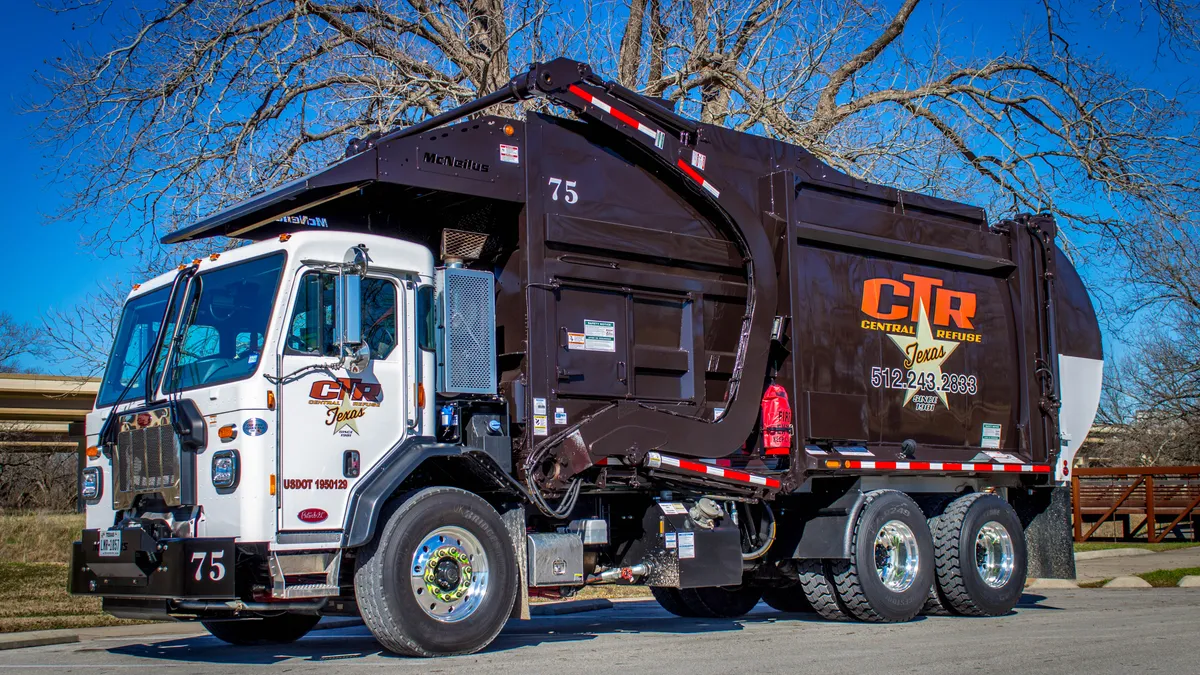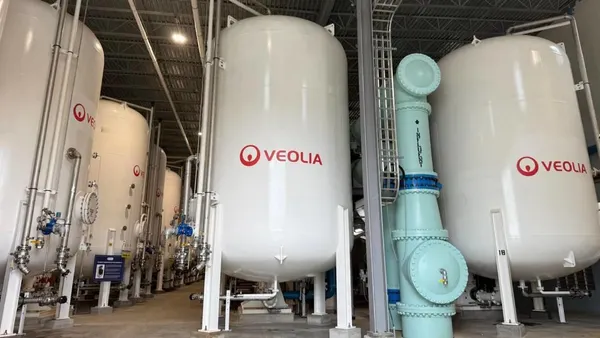Dive Brief:
- Integrated Waste Solutions Group (IWSG) recently made its first move with a pair of acquisitions that have notable implications for competition in the greater Austin, Texas metro area. The company purchased Central Texas Refuse (CTR), with debt financing from Comerica Bank, and also bought the 130 Environmental Park landfill project from Green Group Holdings.
- CTR is one of the largest independent service providers in the region and was IWSG's primary acquisition target, according to company leaders. The hauler will continue operating under its original name and General Manager Mike Lavengco will become CEO of IWSG. The deal includes a range of hauling assets, municipal collection contracts and a single-stream MRF permitted for 6,000 tons per month.
- 130 Environmental Park, located south of Austin in Caldwell County, is a project under development with more than 1,200 acres. Approximately 500 acres have been permitted for use as a landfill, with 202 acres dedicated to disposal. The project could also include a 100-acre industrial park and a MRF, which is still being designed.
Dive Insight:
IWSG was founded by Charlie Appleby and Chris Beall. Appleby, IWSG's chairman, was a founder of Advanced Disposal Services in 2000 and departed as CEO in 2014. Beall was previously a partner at Highstar Capital, which purchased Advanced in 2006, and helped lead the acquisition of Veolia North America's solid waste assets in 2012. He later founded NOVA Infrastructure, the owner of an unspecified stake in IWSG. Green Group Holdings has also become a minority owner.
Appleby recently told Waste Dive he envisions IWSG using a strategy of "integrated geographic hubs" for disposal and recycling similar to the one that made Advanced Disposal one of the industry's largest players. Following the first two deals in Texas, IWSG could enter a variety of other areas.
“As long as we have a rational approach to achieving that integration, we would go into other marketplaces," said Appleby, noting that could include disposal neutral markets. "What you don’t want to do is find yourself in a marketplace where your primary competitors control the only disposal option. That’s not usually a recipe for a highly successful business."
While IWSG declined to discuss financial terms or the specific nature of its ownership, board member David Green said the company is “extremely well positioned from a capital standpoint." He is president of Green Group Holdings, the developer behind 130 Environmental Park and three other greenfield landfill projects to date.
While Texas may already be home to many large waste companies, Green described the Austin area as more unique from a competitive landscape. Republic Services exited the market in 2018, after a local landfill closed due to a consent agreement, by divesting its remaining assets to Waste Management. The Houston-based giant's own Austin landfill is nearing capacity and faces a difficult expansion process. The region's other landfill is owned by Texas Disposal Systems, a private company.
“That’s really not a healthy environment from a competitive standpoint and a customer service standpoint," said Green, later making his case for why the national waste industry needed more alternatives to the current handful of large publicly-traded companies. "I think there’s communities and customers that would like to have another option."
IWSG's business case will first be tested in the Austin market, which has consistently been among the fastest-growing metro areas in the United States. Green said CTR will now be "much more competitive" once it can internalize waste into the new landfill, which overlaps closely with the company's current service area. CTR already provides collection service for Lockhart (the county seat of Caldwell) and local officials approved the assignment of that contract to IWSG on March 31, as reported by the Lockhart Post-Register.
The 130 Environmental Park landfill project has been eight years in the making and sparked ongoing public opposition leading up to permit approval by the Texas Commission of Environmental Quality in December 2017. Construction is set to begin this year and the landfill is currently projected to open in 2021.
While even the industry's largest waste and recycling companies are expected to see financial effects from the recent coronavirus-induced downturn, and some M&A activity seems to have temporarily slowed, the business case for vertically-integrated waste and recycling companies remains resilient. Appleby declined to share growth targets, but did not limit the company's potential scale.
“Our strategy is not to grow to a certain revenue number, it’s to execute the strategy. And this strategy can grow to a very large company," said Appleby. “We don’t have any restriction on our ability to grow, and we’re going to grow wherever it makes sense and whenever it makes sense."











